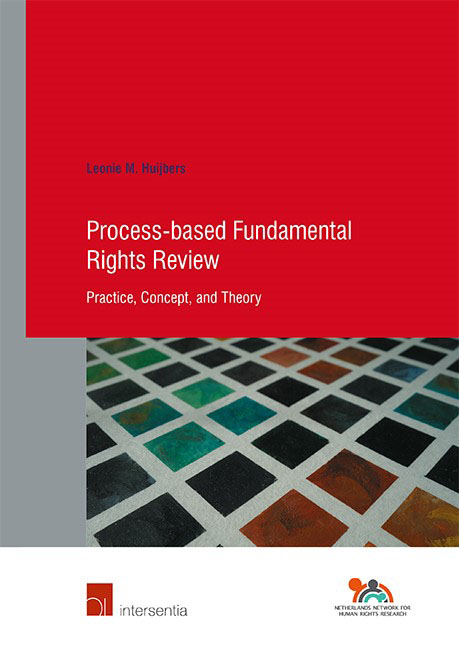Book contents
- Frontmatter
- Acknowledgments
- Contents
- List of Abbreviations
- INTRODUCTION
- PART I THE PRACTICE OF PROCESS-BASED FUNDAMENTAL RIGHTS REVIEW
- PART II THE CONCEPT OF PROCESS-BASED FUNDAMENTAL RIGHTS REVIEW
- PART III THE THEORY ON PROCESS-BASED FUNDAMENTAL RIGHTS REVIEW
- CONCLUSION
- Addendum: Questions for ECtHR Judges
- Summary
- Samenvatting
- Bibliography
- Official Documents
- Case-Law (by Jurisdiction)
- Case-Law (by Name)
- Curriculum vitae
- Human Rights Research Series
- Index
Chapter 10 - Conclusion
Published online by Cambridge University Press: 11 November 2021
- Frontmatter
- Acknowledgments
- Contents
- List of Abbreviations
- INTRODUCTION
- PART I THE PRACTICE OF PROCESS-BASED FUNDAMENTAL RIGHTS REVIEW
- PART II THE CONCEPT OF PROCESS-BASED FUNDAMENTAL RIGHTS REVIEW
- PART III THE THEORY ON PROCESS-BASED FUNDAMENTAL RIGHTS REVIEW
- CONCLUSION
- Addendum: Questions for ECtHR Judges
- Summary
- Samenvatting
- Bibliography
- Official Documents
- Case-Law (by Jurisdiction)
- Case-Law (by Name)
- Curriculum vitae
- Human Rights Research Series
- Index
Summary
INTRODUCTION
Process-based fundamental rights review concerns judicial reasoning that assesses public authorities’ decision-making processes in light of procedural fundamental rights standards. This type of review raises various challenges. There are broad and fundamental theoretical debates relating to the use of process-based review in fundamental rights cases, as has been explained in Chapters 7–9. These debates concern, inter alia, courts’ expertise, their function as guardians of fundamental rights, their place in deliberative democratic societies, and their role in deciding specific kinds of cases, such as cases that require moral or empirical reasoning due to normative indeterminacy and epistemic uncertainties. Underlying the positions taken in these debates, there are diverging views on, and conceptions of, the appropriate role of courts in democratic societies, the relationship between law, morality, and empiricism, and the importance of procedures in fundamental rights protection. Based on contextual factors surrounding courts and judicial decision-making, together with legal traditions and individual viewpoints, these debates have at times turned to an almost black-andwhite discussion concerning the value of procedural reasoning in fundamental rights cases. Some wholeheartedly embrace process-based fundamental rights review; others dismiss it in principle.
The submission in this last chapter is that such a black-and-white debate is based on an erroneous conceptualisation of process-based review. As the findings of Part II of this book evidence, it is difficult, if not impossible, to make a sharp distinction between procedural reasoning and substantive reasoning. As was explained in Chapter 5, both are extremes placed at opposite ends of the judicial review spectrum. For that reason, fundamental rights review is best perceived as less or more procedural or substantive in nature. Furthermore, Chapter 6 has shown that process-based review can be applied in a myriad of ways. Courts can assess compliance with procedural standards as part of the proportionality test, as part of determining the intensity of review, as part of their review of the legitimacy of the aim(s) pursued, or as part of the suitability or necessity of a measure. Their process-based assessment can be strict and thorough, or more deferential and lenient. In addition, the procedural standards against which procedures are tested may stem from different authorities and they may be of a different nature, for example relating to the certainty, rationality, or fairness of procedures.
- Type
- Chapter
- Information
- Process-based Fundamental Rights ReviewPractice, Concept, and Theory, pp. 365 - 396Publisher: IntersentiaPrint publication year: 2021



